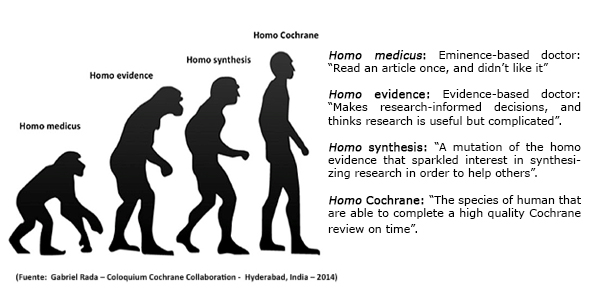In 1935, Archibald Leman ("Archie") Cochrane, the eminent Scottish epidemiologist, marched along the streets of London holding a placard stating, “All effective treatments must be free.” He did this in contrast with the syndicate's banners, which read, “All treatments must be free.” Cochrane was a poet, was multilingual and very literate individual, and is now recognised as the pioneer of considering the importance of high quality information in clinical effectiveness. His career path can be described as rather unconventional since he interrupted his medical training twice. The first time was during the Spanish Civil War, where he served as a volunteer in Aragón. The second interruption occurred after he was captured in Salonica, Greece, after which he became a prisoner of war in Crete and Germany until 1945.
Since childhood Cochrane suffered from porphyria. This, along with his experience as a war physician, compelled him to declare that most of the actions performed in medicine lack sufficient evidence to justify their use. Until his twilight years, he attempted to integrate the concept of the scientific method into the medical community. Most significantly, he once declared: “I was afraid that I shortened the lives of some of my friends by unnecessary interventions.” He proposed the idea of generating an international registry of randomised clinical trials, and suggested the necessity to adopt explicit criteria in order for their quality to be assessed. Today, Cochrane Collaboration counts more than 800,000 articles and approximately 35,000 members worldwide. These members are volunteers, motivated by the generosity of sharing their knowledge, as well as their determination not to leave their continuing education in the hands of pharmaceutical companies.
In January 2015, I had the privilege to attend a workshop at the US Cochrane Center located at Johns Hopkins University, along with a wide range of other participants of diverse nationalities. Much to my surprise, Dr. Richard Worwald, Director of the Cochrane Eyes and Vision Group, gave the opening talk and initiated the conference by referring to those individuals who have made substantial contributions to evidence-based medicine. After summarising the story of Archie Cochrane, Dr. Worwald continued with the following words:
I was delighted to hear Gabriel Rada's talk on capacity development at Cochrane’s last Colloquium in Hyderabad, India 2014. He showed slides depicting the evolution of medical minds from Homo Medicus, who relied on eminence-based medicine through Homo Synthesis to Homo Cochrane, who has evolved into a higher level of being and intelligence capable of summarising, synthesising and disseminating high quality evidence by the timely production of Cochrane systematic reviews. Not only amusing but also true in terms of awareness and capacity of development. I consider him a great example of collaboration, and his proposal highly relevant to most physicians around the world who need to get on with plenty or rapid evolution.
Dr. Worwald talked in detail about Epistemonikos, as a Chilean initiative, and about the images with which Dr. Rada parodies the evolution of medical knowledge from the Homo Medicus to the Homo Cochrane. As Dr. Rada is one of the editors of this journal, his vision is quite interesting in that it allows us to better understand the notion that as physicians evolve on this scale, the higher their capacity is developed to respond to a student´s question in the manner of, “I do not know the answer, but I do know how to search for it.”
Figure 1. Model of evolution of the medical professionals regarding information management
When someone displays humility in recognising someone else´s good academic work, we are able to feel admiration both for the person he/she is paying tribute to, as well as for the person who is paying the tribute. During Dr. Worwald's presentation, I felt honoured to be present, and proud of my country´s development. Currently, three centers belonging to the Ibero-American Cochrane Collaboration are located in Chile, and we count on twenty-one systematic reviews by Chilean authors, as well as thirty ongoing protocols.
Although it may seem counter-intuitive to hear that accolades for merits sometimes are better recognised abroad, today I feel the need to share this experience with our readers, both as a Chilean and as a co-editor of this journal, along with Gabriel Rada. It is indeed an honour for the Medwave team to travel around the world to be present in order to reap the well-deserved praise for the efforts sown by one of our countrymen.
Congratulations to our Editor Dr. Rada, and to every Chilean who chooses the path of seeking relevant information rather than mere data accumulation.

 Figure 1. Model of evolution of the medical professionals regarding information management
Figure 1. Model of evolution of the medical professionals regarding information management
 Esta obra de Medwave está bajo una licencia Creative Commons Atribución-NoComercial 3.0 Unported. Esta licencia permite el uso, distribución y reproducción del artículo en cualquier medio, siempre y cuando se otorgue el crédito correspondiente al autor del artículo y al medio en que se publica, en este caso, Medwave.
Esta obra de Medwave está bajo una licencia Creative Commons Atribución-NoComercial 3.0 Unported. Esta licencia permite el uso, distribución y reproducción del artículo en cualquier medio, siempre y cuando se otorgue el crédito correspondiente al autor del artículo y al medio en que se publica, en este caso, Medwave.

 Autora:
Eva Madrid[1,2,3]
Autora:
Eva Madrid[1,2,3]

Citación: Madrid E. Moving from opinion-based Homo Medicus to evidence-based Homo Cochrane. Medwave 2015 Mar;15(2):e6102 doi: 10.5867/medwave.2015.02.6102
Fecha de publicación: 20/3/2015

Nos complace que usted tenga interés en comentar uno de nuestros artículos. Su comentario será publicado inmediatamente. No obstante, Medwave se reserva el derecho a eliminarlo posteriormente si la dirección editorial considera que su comentario es: ofensivo en algún sentido, irrelevante, trivial, contiene errores de lenguaje, contiene arengas políticas, obedece a fines comerciales, contiene datos de alguna persona en particular, o sugiere cambios en el manejo de pacientes que no hayan sido publicados previamente en alguna revista con revisión por pares.
Aún no hay comentarios en este artículo.
Para comentar debe iniciar sesión